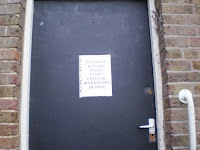
Though notionally in London, and only half an hour from Waterloo, places like Claygate have a faux village atmosphere that resembles a war-time film set or a real-life recreation of Ambridge.You almost expect the village pub to be called The Bull, not The Foley Arms.

However, some chances are too rare to pass up, and knowing I'd be safely back in Lewisham by nightfall, I attended a couple of two-hour work - shops at in the Claygate & Esher Writing Festival. It was organised by Susannah Rickards, who also tutors a local writing group. The pub where it took place was only five minutes walk from the station.
The first workshop,'Storm in a Teacup: Writing for Women's Magazines' , was run by Geraldine Ryan. I've been trying to write womag stories for a while, with no success although I've analysed stories, looked at websites and even read how-to-write books. It's a demanding genre.

Geri's name crops up regularly in magazines like Woman's Weekly and Take A Break. She has two stories currently appearing in latter's the Christmas Fiction Feast. She shared her considerable knowlege and answered questions for the first hour of her session; in the second half we worked in groups to re-assemble a story of hers that she made copies of before cutting it up for reassembly.
Geri's 'advice' could be summed up as: 'know the market', and instructions included essentials like knowing the word-count for different magazines, keeping up-to-date with current editorial requirements through websites and of course studying the published stories. She gave us a hand-out which analysed stories from Woman's Weekly in terms of themes. A natural optimist, she said she didn't find it difficult to to be upbeat (essential) but thought it important that a writer should be 'true to herself' when it came to choosing topics. She didn't write animal stories for instance. As she has four children, I wasn't really surprised. Two of her many useful tips stood out for me: if a story could be summed up in a sentence it was probably a good one, and it was good to have a particular reader in mind when writing.
Although the world of the women's magazine story might be small, something must happen in it to bering about some kind of change; her advice about plotting was succinct : 'Get in. Get on. Get out.'
We enjoyed working in groups to reassemble copies of one of Geri's stories, with an ensuing discussion that underlined elements such as plot, dialogue, flashback, turning points and climax.

Susannah took a slightly different approach, eliciting resonses and sharing experience of acting as a competition judge as well as a prize-winner for her workshop on 'Writing for Competitions'. The group consisted mainly of her regular class, so she had more 'notional' time than Geri. At the the end she was able to set a 'homework' writing task based on the event, to be a mini-competiton with a prize!

Starting with the benefits of competition writing, i.e. receiving feedback, possiby attracting an agents and learning to work to deadlines, she went on to discuss the status or tiers of competitions, from the most prestigious (Fish; BBC; Bridport)to small local competitions. As an experienced competition judge she was well placed to give tips on a range of issues, from the importance of reading past winning entries, layout and the role of white spaces in the text, to tips on style.
A mini-exercise on how to treat a short story topic showed how to add the little extras to catch the judges attention. Titles, opening paragraphs and endings, were covered, as well as character and dialogue.

It was good to feel part of a group for even a short time. My only regret was that I wasn't able to attend other events in this weekend Festival. I'd have liked to hear Emma Darwin on writing for radio, for instance, and Vanessa Gebbie on writing Flash Fiction, but the timing was against me. Oh, well, maybe next year...



